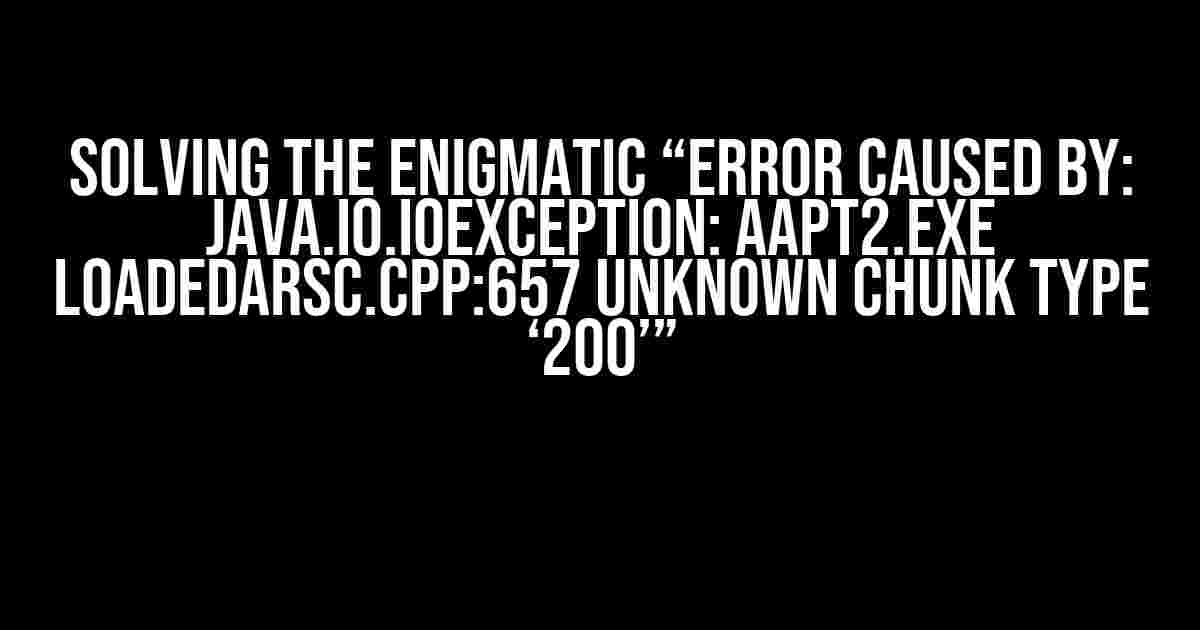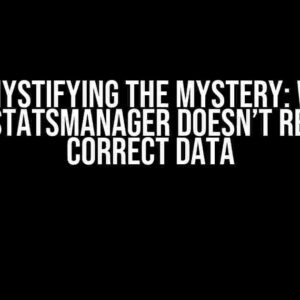Has your Android app development journey been interrupted by the mysterious “Error Caused by: java.io.IOException: aapt2.exe LoadedArsc.cpp:657 Unknown chunk type ‘200’”? Fear not, dear developer! This article will guide you through the troubleshooting process, providing you with clear and direct instructions to overcome this obstacle.
Understanding the Error
The error message “Error Caused by: java.io.IOException: aapt2.exe LoadedArsc.cpp:657 Unknown chunk type ‘200’” typically occurs during the build process of an Android app, specifically when the Android Asset Packaging Tool (aapt2) is executing. This tool is responsible for compiling and packaging the app’s resources, such as images, layouts, and strings, into a single APK file.
The error is often accompanied by a cryptic message, making it challenging to diagnose the root cause. But don’t worry, we’ll break it down for you:
java.io.IOException: This indicates an input/output exception occurred during the execution of the aapt2.exe process.aapt2.exe: This is the executable responsible for compiling and packaging the app’s resources.LoadedArsc.cpp:657: This refers to the specific line of code within the LoadedArsc.cpp file where the error occurred.Unknown chunk type '200': This is the primary cause of the error, indicating that the aapt2.exe process encountered an unknown or unsupported chunk type (in this case, ‘200’) while processing the app’s resources.
Possible Causes and Solutions
Now that we’ve demystified the error message, let’s explore the possible causes and solutions:
Cause 1: Corrupted or Invalid Resource Files
One common reason for the error is the presence of corrupted or invalid resource files in your project. These can be images, layouts, or other resource files that are not properly formatted or contain errors.
Solution:
- Review your project’s resource files and identify any potential issues.
- Check for corrupted or invalid files and remove or replace them as necessary.
- Clean and rebuild your project to ensure the changes take effect.
Cause 2: Outdated or Incompatible Android Gradle Plugin
Using an outdated or incompatible Android Gradle plugin can lead to the “Unknown chunk type ‘200’” error.
Solution:
- Check the Android Gradle plugin version in your project’s
build.gradlefile. - Update the plugin to the latest version compatible with your Android Studio version.
- Sync your project with the new plugin version and rebuild.
Cause 3: Conflicting or Duplicate Resource Files
Having conflicting or duplicate resource files in your project can also trigger the error.
Solution:
- Review your project’s resource files and identify any duplicates or conflicts.
- Remove or rename the conflicting files to ensure only one version remains.
- Clean and rebuild your project to reflect the changes.
Cause 4: aapt2.exe Configuration Issues
In some cases, the aapt2.exe configuration might be causing the error.
Solution:
- Check the
aapt2.execonfiguration in your project’sbuild.gradlefile. - Verify that the configuration is correct and matches the recommended settings.
- Adjust the configuration as necessary and rebuild your project.
Troubleshooting Steps
If the above solutions don’t resolve the error, follow these additional troubleshooting steps:
- Clean and rebuild your project: Sometimes, a simple clean and rebuild can resolve the issue.
- Invalidate and restart Android Studio: This can help resolve any cache-related issues.
- Check the Android Studio log: Review the log for any additional error messages or clues that might help diagnose the issue.
- Disable and re-enable the aapt2.exe: Try disabling the aapt2.exe and then re-enabling it to see if the error resolves.
- Check for third-party library conflicts: If you’re using third-party libraries, try removing or updating them to see if they’re causing the conflict.
Conclusion
The “Error Caused by: java.io.IOException: aapt2.exe LoadedArsc.cpp:657 Unknown chunk type ‘200’” error can be frustrating, but by following the steps outlined in this article, you should be able to identify and resolve the underlying cause. Remember to stay calm, methodically troubleshoot the issue, and don’t hesitate to seek help if needed. Happy coding!
<android>
<!-- ... -->
<resource>
<!-- Ensure only one version of the resource file exists -->
<file>your_resource_file.xml</file>
</resource>
</android>
| Cause | Solution |
|---|---|
| Corrupted or Invalid Resource Files | Review and remove/replace corrupted files, clean and rebuild project |
| Outdated or Incompatible Android Gradle Plugin | Update plugin to latest version, sync project, and rebuild |
| Conflicting or Duplicate Resource Files | Remove/rename conflicting files, clean and rebuild project |
| aapt2.exe Configuration Issues | Verify and adjust aapt2.exe configuration, rebuild project |
Remember to bookmark this article for future reference, and don’t hesitate to share your experiences and solutions in the comments below!
Frequently Asked Question
If you’re struggling with the “Error Caused by: java.io.IOException: aapt2.exe LoadedArsc.cpp:657 Unknown chunk type ‘200’” error, you’re not alone! Here are some frequently asked questions to help you troubleshoot and solve this frustrating issue.
What is this error and why is it happening?
This error occurs when the Android Asset Packaging Tool (AAPT2) encounters an unknown chunk type ‘200’ while processing resources. It’s usually caused by a corrupted or incompatible resource file, such as a PNG or XML file. This can happen when you’ve updated your Android SDK or Gradle plugin, or when you’ve added a new library or dependency to your project.
How do I identify the corrupted resource file?
To identify the corrupted file, try to build your project with the –stacktrace option enabled. This will provide more detailed information about the error, including the file path and line number where the error occurred. You can also try cleaning and rebuilding your project, or deleting the build folder and rebuilding from scratch.
Can I fix this error by updating my Android SDK or Gradle plugin?
Maybe! Updating your Android SDK or Gradle plugin may resolve the issue, especially if you’re using an outdated version. However, it’s not a guarantee, and you may need to try other troubleshooting steps as well. Make sure to check the Android documentation and Gradle release notes for any known issues or changes that may affect your project.
What if I’m using a third-party library or dependency that’s causing the error?
If you suspect that a third-party library or dependency is causing the error, try updating or reverting to a previous version of the library. You can also try excluding the library from your build process or modifying the library’s resource files to see if that resolves the issue. If all else fails, consider reaching out to the library’s developers or seeking help from the community.
Is there a workaround or temporary fix for this error?
Yes, there are a few workarounds you can try. One approach is to disable AAPT2 and use the older AAPT tool instead. You can do this by adding the following line to your build.gradle file: android.enableAapt2=false. Keep in mind that this is a temporary fix and may not work for all projects. Another option is to try using a different resource compression algorithm, such as zlib or lz4.


